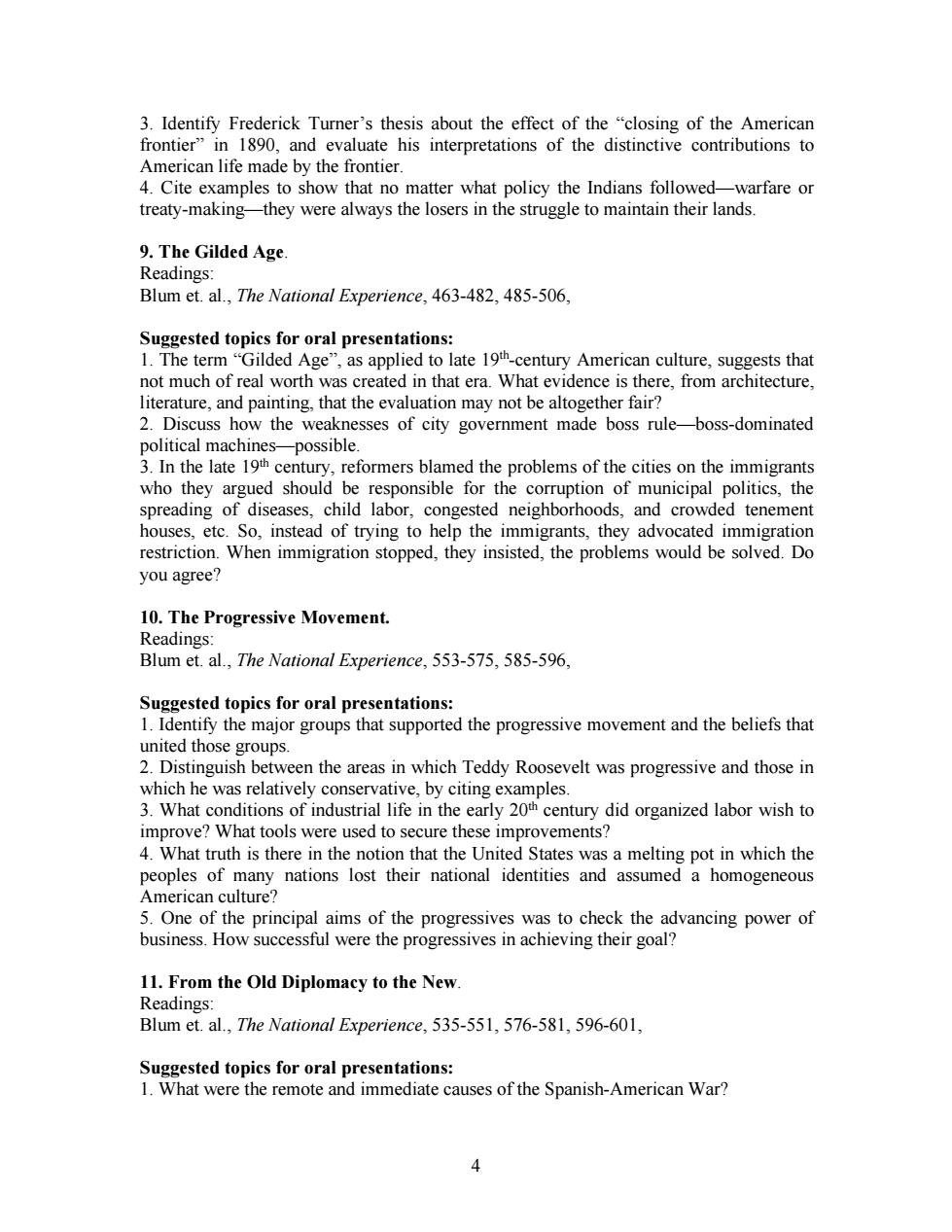正在加载图片...

3.Identify Frederick Turner's thesis about the effect of the "closing of the American frontier"in 1890,and evaluate his interpretations of the distinctive contributions to American life made by the frontier. 4.Cite examples to show that no matter what policy the Indians followed-warfare or treaty-making-they were always the losers in the struggle to maintain their lands. 9.The Gilded Age Readings: Blum et.al.,The National Experience,463-482,485-506, Suggested topics for oral presentations: 1.The termGilded Age",as applied to late 19h-century American culture,suggests that not much of real worth was created in that era.What evidence is there,from architecture, literature,and painting,that the evaluation may not be altogether fair? 2.Discuss how the weaknesses of city government made boss rule-boss-dominated political machines-possible. 3.In the late 19th century,reformers blamed the problems of the cities on the immigrants who they argued should be responsible for the corruption of municipal politics,the spreading of diseases,child labor,congested neighborhoods,and crowded tenement houses,etc.So,instead of trying to help the immigrants,they advocated immigration restriction.When immigration stopped,they insisted,the problems would be solved.Do you agree? 10.The Progressive Movement. Readings: Blum et.al.,The National Experience,553-575,585-596, Suggested topics for oral presentations: 1.Identify the major groups that supported the progressive movement and the beliefs that united those groups. 2.Distinguish between the areas in which Teddy Roosevelt was progressive and those in which he was relatively conservative,by citing examples. 3.What conditions of industrial life in the early 20th century did organized labor wish to improve?What tools were used to secure these improvements? 4.What truth is there in the notion that the United States was a melting pot in which the peoples of many nations lost their national identities and assumed a homogeneous American culture? 5.One of the principal aims of the progressives was to check the advancing power of business.How successful were the progressives in achieving their goal? 11.From the Old Diplomacy to the New Readings: Blum et.al.,The National Experience,535-551,576-581,596-601, Suggested topics for oral presentations: 1.What were the remote and immediate causes of the Spanish-American War?4 3. Identify Frederick Turner’s thesis about the effect of the “closing of the American frontier” in 1890, and evaluate his interpretations of the distinctive contributions to American life made by the frontier. 4. Cite examples to show that no matter what policy the Indians followed—warfare or treaty-making—they were always the losers in the struggle to maintain their lands. 9. The Gilded Age. Readings: Blum et. al., The National Experience, 463-482, 485-506, Suggested topics for oral presentations: 1. The term “Gilded Age”, as applied to late 19 th-century American culture, suggests that not much of real worth was created in that era. What evidence is there, from architecture, literature, and painting, that the evaluation may not be altogether fair? 2. Discuss how the weaknesses of city government made boss rule—boss-dominated political machines—possible. 3. In the late 19 th century, reformers blamed the problems of the cities on the immigrants who they argued should be responsible for the corruption of municipal politics, the spreading of diseases, child labor, congested neighborhoods, and crowded tenement houses, etc. So, instead of trying to help the immigrants, they advocated immigration restriction. When immigration stopped, they insisted, the problems would be solved. Do you agree? 10. The Progressive Movement. Readings: Blum et. al., The National Experience, 553-575, 585-596, Suggested topics for oral presentations: 1. Identify the major groups that supported the progressive movement and the beliefs that united those groups. 2. Distinguish between the areas in which Teddy Roosevelt was progressive and those in which he was relatively conservative, by citing examples. 3. What conditions of industrial life in the early 20 th century did organized labor wish to improve? What tools were used to secure these improvements? 4. What truth is there in the notion that the United States was a melting pot in which the peoples of many nations lost their national identities and assumed a homogeneous American culture? 5. One of the principal aims of the progressives was to check the advancing power of business. How successful were the progressives in achieving their goal? 11. From the Old Diplomacy to the New. Readings: Blum et. al., The National Experience, 535-551, 576-581, 596-601, Suggested topics for oral presentations: 1. What were the remote and immediate causes of the Spanish-American War?